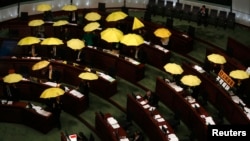Pro-democracy lawmakers in Hong Kong raising yellow umbrellas, a symbol of the territory's Occupy movement, walked out of a parliamentary session Wednesday when Chief Secretary Carrie Lam said the government was sticking with a proposal to pre-screen candidates for the city's 2017 election.
Wednesday's walkout signaled support for protests that have crippled the city since late last year, after the plan was introduced.
The plan would subject would-be candidates to pre-screening by a committee that opponents say is biased towards Beijing.
Civic Party pro-democracy legislator Alan Leong spoke to reporters after the protest.
“We would rather see the Hong Kong government present the restricted plan to the legislature and let us veto it, so that the Central Government [in Beijing] could have more time if it would re-start the five-step political reform [process]," he said.
Pro-democracy supporters are calling for free elections that would let the city choose its own leadership without Beijing's control.
Lam said in her address Wednesday that constitutional development must be built on the basis of the Beijing-backed plan. But she held out the hope of persuading opponents to support the reforms.
"Despite the legal framework that has been laid down by the National People's Congress Standing Committee, we truly believe we still have the opportunity to devise a set of electoral arrangements which is fair, open, transparent and highly competitive," said Lam.
On December 31, Hong Kong police arrested 12 protesters as pro-democracy demonstrators returned to the Mong Kok neighborhood that hundreds had occupied for more than two months.
Police said Thursday they used pepper spray and batons in overnight clashes and arrested demonstrators on charges ranging from assaulting a police officer to failing to produce proof of identity.
It was the first sizeable rally since the last protest camp was cleared out on December 15.
A 70-year-old Hong Kong citizen who would only give his family name, Mr. Wong, is among about 100 people who are occupying the sidewalks near Hong Kong’s government headquarters. He says he is there to urge legislators to reject Beijing's election plan.
“I have been telling citizens that this political reform plan is [terrible], unacceptable, and telling our 70 respectable legislators especially that they should use their conscience and veto this political reform plan,” he told VOA.
At its peak, the Occupy protest movement attracted tens of thousands of demonstrators, presenting an unprecedented challenge to Beijing's rule of Hong Kong. The last protest camp was cleared out on December 15 and protests outside government headquarters are now allowed between 7 am and 11 pm.
The former British colony was returned to China in 1997. As a semiautonomous Chinese territory, Hong Kong citizens enjoy many freedoms not allowed on the mainland.
This report was produced in collaboration with the VOA Cantonese Service.




